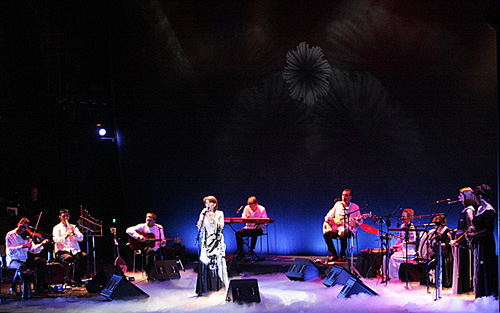A term like “Eastern European music” gets bandied about by many, including me. It’s one of those convenient generalizations used to cover a category that’s more than a category. From folkloric traditions and age-old ballads to mighty brass bands and fusions that were free to happen in post-communist societies, there’s a lot to take in.

Bilja Krstic and the Bistrik Orchestra offer up Svod: Traditional Songs from Serbia and The Balkans (ARC Music, 2016). I remain unclear as to how many pieces constitutes an orchestra, but this outfit’s 9-strong lineup (plus guest players) proceeds with delightful zest through a set of mainly traditional tunes that retain the heartfelt sevdah (Balkan blues) intent and add enough rhythmic swing to lift the spirits and stir the hips.
Krstic’s soaring (but never overbearing) vocals are a marvel in settings of both sparse accompaniment that lets the emotional content sink in and full band buildups often jazz-like in the way they flow. At times sporting a serenity that seems to stop all else before breaking into a dance-inducing left turn, this highly satisfying collection succeeds on those levels and more, including one spine-tingling a capella track.

In rather stark contrast stands Put (Geenger Records, 2016) by the Zagreb-based trio of Franolic, Jovanovic and Culap. The three play oud (Arabic lute), harmonica and percussion respectively, and while there’s a Balkan sensibility running through their rhythms and melodies, influences from Turkey, India and anywhere blues and jazz have permeated are evident as well.
The oud and harmonica shadow each other with a symbiosis that lets them both take turns slinking or springing forward to take the lead as the percussion (primarily frame drum and ceramic udu) marks changes in time and mood and does some leading of its own. Put has got atmosphere to spare, but there’s a core to this music that’s covertly fierce and passionate. Consider it essential listening.

Of course, klezmer -that celebratory brand of Jewish music rooted in the 19th century and well able to get the heart pounding here in the 21st- is one sort of Eastern European music that’s immediately identified with the region and the people who created it. The Klezmatics have been foremost in keeping the sound alive for 30 years and they’re unlikely to stop anytime soon, which is good news for all of us. On Apikorsim/Heretics (World Village, 2016) the band is as crazy cool and ingeniously mad as ever, harnessing their arsenal of brass, reeds, violin, viola, accordion, guitar, bass, piano, organ, harmonium, kaval, tsimbl, drums, percussion and vocals (dang, that’s a lot of instruments when you consider there’s only 6 people in the band) to create Yiddish songs that are lively and infectious almost beyond belief.
Just as important, they see to it that klezmer’s roots as music of an enduring, vibrant culture are not overlooked in serious or humorous terms. So while songs like “May Redemption Come” and “Who Guides the Ships?” are sincere in their spiritual perspective and “My Mother’s Mirror” pulls no punches on the reality of aging, there’s room for a gastronomically indulgent “Party in Odessa” and a close examination on the title track of exactly what makes happy heretics happy. The Klezmatics are in prime form, playing music they’ve not only mastered but obviously continue to love very deeply.
—
headline photo: Bilja Krstic and the Bistrik Orchestra
Author: Tom Orr
Tom Orr is a California-based writer whose talent and mental stability are of an equally questionable nature. His hobbies include ignoring trends, striking dramatic poses in front of his ever-tolerant wife and watching helplessly as his kids surpass him in all desirable traits.


